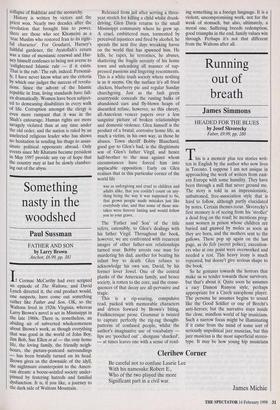Something nasty in the woodshed
Paul Sussman
FATHER AND SON by Larry Brown Anchor, £6.99, pp. 381 If Cormac McCarthy had ever scripted an episode of The Waltons, and David Lynch directed it, the end product would, one suspects, have come out something rather like Father and Son. OK, so the Waltons lived in 1920s Virginia, whereas Larry Brown's novel is set in Mississippi in the late 1960s. There is, nonetheless, an abiding air of subverted wholesomeness about Brown's work, as though everything that was good in the world of John Boy, Jim Bob, Sue Ellen et al — the cosy home life, the loving family, the friendly neigh- bours, the picture-postcard surroundings — has been brutally turned on its head. Brown gives us the downside of the idyll, the nightmare counterpoint to the Ameri- can dream: a booze-sozzled society under- pinned by festering hatreds and familial dysfunction. It is, if you like, a journey to the dark side of Waltons Mountain. Released from jail after serving a three- year stretch for killing a child whilst drunk- driving, Glen Davis returns to the small Mississippi community where he grew up. A cruel, embittered man, tormented by perceived injustices and fired by alcohol, he spends the next five days wreaking havoc on the world that has spawned him. He kills, he rapes, he terrorises, he abuses, shattering the fragile serenity of his home town and unleashing all manner of sup- pressed passions and lingering resentments. This is a white trash society where nothing is as it seems. On the surface it's all fried chicken, blueberry pie and regular Sunday churchgoing. Just as the lush green countryside conceals the rusting hulks of abandoned cars and fly-blown heaps of discarded refuse, however, so this cheery, all-American veneer papers over a less sanguine picture of broken relationships and domestic violence. Glen himself is the product of a brutal, corrosive home life, as much a victim, in his own way, as those he abuses. Town sheriff Bobby Blanchard, good guy to Glen's bad, is the illegitimate son of Glen's father Virgil, and hence half-brother to the man against whom circumstances have forced him into implacable opposition. Early on Glen realises that in this particular corner of the world life
was as unforgiving and cruel to children and adults alike, that you couldn't count on any- thing being the way it was supposed to be, that grown people made mistakes just like everybody else, and that some of those mis- takes were forever lasting and would follow you to your grave.
The 'Father and Son' of the title refers, ostensibly, to Glen's dealings with his father Virgil. Throughout the book, however, we are confronted with recurrent images of other father-son relationships turned sour. Bobby arrests one man for murdering his dad, another for beating his infant boy to death. Glen refuses to acknowledge his own son, David, by his former lover Jewel. One of the central planks of the American family, and hence society, is rotten to the core, and the conse- quences of that decay are all-pervasive and tragic.
This is a rip-roaring, compulsive read, packed with memorable characters and driven forward by Brown's biting, Faulkneresque prose. Grammar is twisted to capture perfectly the zig-zag thought- patterns of confused people, whilst the author's imaginative use of vocabulary lips are `pooched out' , shotguns 'shucked', — at times leaves one with a sense of read- ing something in a foreign language. It is a violent, uncompromising work, not for the weak of stomach, but also, ultimately, a moral one. Suffering breeds redemption, good triumphs in the end, family values win through. Perhaps it's not that different from the Waltons after all.

























































 Previous page
Previous page